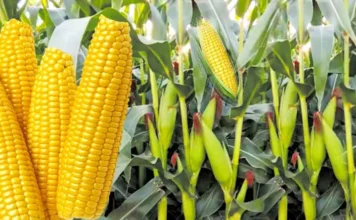As part of its plans to achieve food security through boosting farmers’ production, the Federal Government on Tuesday, launched varieties of the newly released transgenic maize that are drought and pest-resistant, and declared that the new crop would double the production of maize in Nigeria.
It released the crop varieties in partnership with the African Agricultural Technology Foundation, and the Institute for Agricultural Research in Abuja, where farmers under the aegis of the All Farmers Association of Nigeria were given some of the new maize varieties to cultivate.
Sabi Abdullahi, the Minister of State for Agriculture and Food Security, who unveiled the crop during the Tela Maize Nigeria Launch, said the new maize varieties would ensure sustainable production of the crop in Nigeria and drastically cut down production losses.
He said, “The issue with Tela maize is that it is high yielding, which means the present yield farmers are making will be more than doubled, based on what the researchers told us. The yield will rise from the current two or three tonnes to as high as nine to 10 tonnes.
“In fact, it will triple. So instead of three (tonnes), you will get up to nine (tonnes), or even more than that. Now, for us, beyond that also, when you plant the ones we are having, and there’s an attack by pests that leads to almost 100 per cent loss of production. And it is of concern, which means you will labour for four months and go home with nothing.
“So this variety is here to solve that problem in a manner that at the end of the day, it is resistant to the Fall Armyworms and the stem borer insects that are known to farmers. That is the problem that these new varieties are out to solve. This explains why we went into this research, which is to guarantee sustainable production of maize year-on-year.”
Canisius Kanangire, the Executive Director, AATF, described the launch of Tela maize varieties in Nigeria as a testament to the commitment by the agricultural foundation and the Federal Government towards bringing advanced, resilient crop varieties to Nigerian farmers.
“These maize varieties are drought-tolerant and resistant to the devastating Fall Armyworm and stem borer pests, which have plagued maize crops across the continent. Our collaboration with the Federal Government and the national institutions and agencies has been critical to this progress.
“We have witnessed, firsthand, what collaboration across ministries, organisations, and sectors can achieve. Under the Tela Maize Project, the Federal Government facilitated the operational environment for key ministries and departments to work together and collaborate towards the attainment of their mandates,” he stated.
Kanangire noted that by promoting policies that support agricultural innovation, the Federal Government helped create an enabling environment for the development and use of genetically modified crops that are safe, productive, and beneficial to smallholder farmers and the environment.
“We believe that effective regulatory oversight and sustained political goodwill is critical to promoting innovation for development. This is what has ensured the timely delivery of the Tela maize technology to an eager farming community in Nigeria.
“The Tela maize varieties offer several benefits. With their resistance to pests and tolerance to drought, Tela maize varieties will boost maize yields, providing more food and income for farmers in Nigeria. These varieties will reduce pesticide use which will lower the overall cost of maize production, making farming more profitable and sustainable,” Kanangire stated.
In his remarks, the Executive Director, IAR, Prof. Ado Yusuf, named the maize varieties to include SAMMAZ 72T, SAMMAZ 73T, SAMMAZ 74T, and SAMMAZ 75T.
“Today’s event is so dear to my heart, seeing we are not only introducing maize varieties that will save Nigerian farmers the cost of production through the reduction in chemical insecticide sprays by up to N2bn annually but also ensuring sustainable food security in the country and across the West African sub-region.
